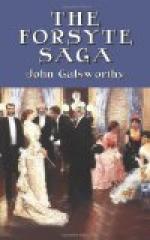Jon heard her uneasily. Did she understand? But he felt once more that he was no match for her in self-control and subtlety. She could, in some supersensitive way, of which he had not the secret, feel the pulse of his thoughts; she knew by instinct what he hoped and feared and wished. It made him terribly uncomfortable and guilty, having, beyond most boys, a conscience. He wished she would be frank with him, he almost hoped for an open struggle. But none came, and steadily, silently, they travelled north. Thus did he first learn how much better than men women play a waiting game. In Paris they had again to pause for a day. Jon was grieved because it lasted two, owing to certain matters in connection with a dressmaker; as if his mother, who looked beautiful in anything, had any need of dresses! The happiest moment of his travel was that when he stepped on to the Folkestone boat.
Standing by the bulwark rail, with her arm in his, she said
“I’m afraid you haven’t enjoyed it much, Jon. But you’ve been very sweet to me.”
Jon squeezed her arm.
“Oh I yes, I’ve enjoyed it awfully-except for my head lately.”
And now that the end had come, he really had, feeling a sort of glamour over the past weeks—a kind of painful pleasure, such as he had tried to screw into those lines about the voice in the night crying; a feeling such as he had known as a small boy listening avidly to Chopin, yet wanting to cry. And he wondered why it was that he couldn’t say to her quite simply what she had said to him:
“You were very sweet to me.” Odd—one never could be nice and natural like that! He substituted the words: “I expect we shall be sick.”
They were, and reached London somewhat attenuated, having been away six weeks and two days, without a single allusion to the subject which had hardly ever ceased to occupy their minds.
II
FATHERS AND DAUGHTERS
Deprived of his wife and son by the Spanish adventure, Jolyon found the solitude at Robin Hill intolerable. A philosopher when he has all that he wants is different from a philosopher when he has not. Accustomed, however, to the idea, if not to the reality of resignation, he would perhaps have faced it out but for his daughter June. He was a “lame duck” now, and on her conscience. Having achieved—momentarily—the rescue of an etcher in low circumstances, which she happened to have in hand, she appeared at Robin Hill a fortnight after Irene and Jon had gone. June was living now in a tiny house with a big studio at Chiswick. A Forsyte of the best period, so far as the lack of responsibility was concerned, she had overcome the difficulty of a reduced income in a manner satisfactory to herself and her father. The rent of the Gallery off Cork Street which he had bought for her and her increased income tax happening to




